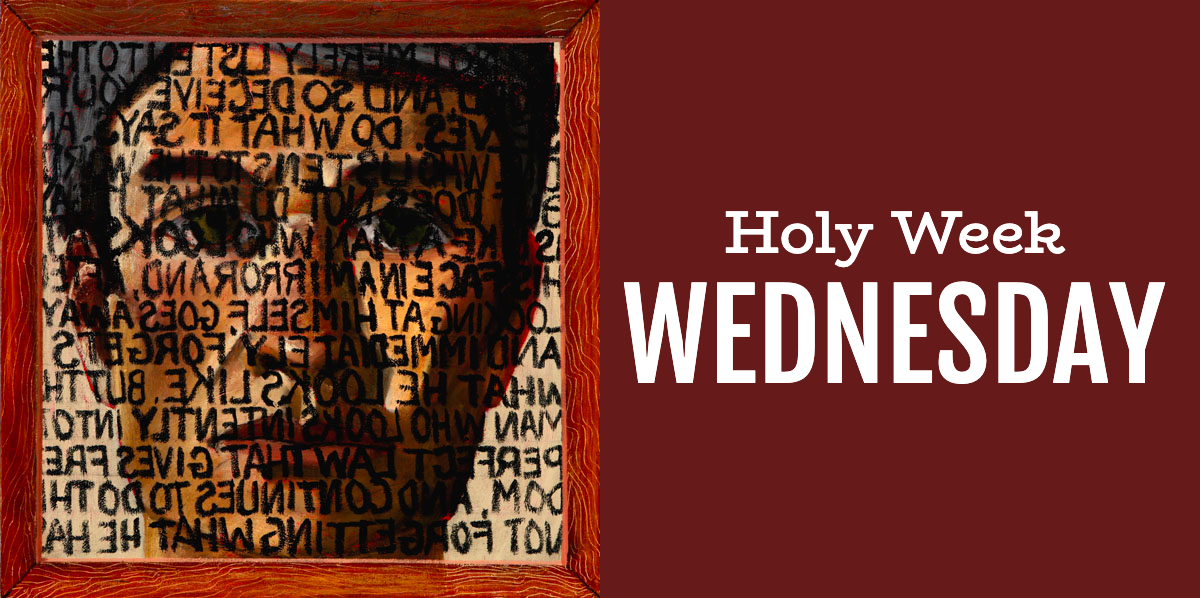A Word From Below Holy Week Devotionalنموونە


Word
“The disciples looked at one another, uncertain of whom he was speaking.” (John 13:21-32)
Made Flesh
The week picks up speed and the mystery deepens. Jesus’ words about death and life are taking on flesh with startling speed. In this reflection, we’re taking Thursday night and breaking it into two pieces so that we can linger longer with the text. Today we are with Judas.
Judas—the object of endless speculation and malicious imagination. In the end, we only know two things for sure. Jesus called Judas to be his disciple, and Judas handed Jesus over. The gospels differ in the motivation. Some blame the money. In John, the devil makes him do it. It is easy to demonize Judas. Never mind the power of the council or the Romans; it’s all Judas’ fault. He is the embodiment of betrayal. The Sunday school lesson is easy: do not be a Judas. Though all the disciples deny and abandon, Judas is the scapegoat.
And there’s where we should be careful. When anyone among us becomes the sole embodiment of what is less than good, we’ve gotten off track. It’s such an attractive, appealing temptation. If it’s all their fault, then it can’t be ours. We can slide right by the verse at the beginning. When Jesus had just declared that one of them would betray him, “the disciples looked at one another, uncertain of whom he was speaking.” They didn’t know. It could have been any one of them. Andrew. James. John. Peter. The beloved disciple—whoever that may have been. Who is it? Who will it be? For a minute did everyone’s breath catch? What am I about to do?
Whatever else “Satan entered into him” might mean, it at least means that it really could have been any one of them. It wasn’t that Judas himself, in his right mind, was especially evil.
This is the tragedy we all have to reckon with. It could have been us. It still could be. And, of course, is.
I really do not want this to be true. It feels much safer to divide everyone up into good people and bad and locate myself securely on the side of the good. My initial response to the reality that it could be any one of us, it could be me, is overwhelming anxiety. What am I about to do? Scapegoating is so much safer, so much more secure.
I am perhaps most prone to this in my closest relationships. I can’t bear that a fight, a disappointment, a betrayal might be my fault. It must be theirs. I am only safe if I cast all the blame on someone else.
Of course, this is precisely what Jesus came to disrupt. As the week wears on, he will enter as deeply into this mystery of death and scapegoating as it is possible to go. But we’re not there yet. We’re living in the in-between time. The invitation here and now is to wrestle with our own capacity for harm—personally, socially, structurally. Not cast it off on others. For once, not minimize or explain away. A pure reckoning with our ability to betray what is most dear to us.
This is deep work. It is only possible with a deep trust in the grace and unending love of Christ—a love that dissolves all rivalry and disarms all scapegoating. As we will see tomorrow, Jesus washed Judas’ feet, too. He sat at the table with him. He broke bread with him. And, I am convinced, as the Forgiving Victim, the words of peace and forgiveness that he breathed in resurrection were spoken for Judas, too.
Dwelling Among Us
Find a quiet place today to sit in a spirit of honest examination, not out of shame, but out of deep reliance on the mercy of God.
Reflection by: Rev. Sarah Wiles
Artwork: "Man in the Mirror 2" by Wayne Forte
Scripture
About this Plan

This devotional combines reflections from Rev. Sarah Wiles and the artwork of Wayne Forte (www.wayneforte.com) to take the reader on a journey through Holy Week, beginning on Monday and ending on Resurrection Sunday. Join us as we journey through the book of John with Jesus to the cross and the empty tomb. Cover image: "Communion 2002" by Wayne Forte
More
پلانە پەیوەستەکان

For the Least of These

Church & Students

Advent Devotional: The Gospel of Luke

I Can and I Will Through God’s Power - 7 Ways to Live Boldly for Christ by Ayub Paul

Embracing the Fear of the Lord

Charis Bible College Fall Bible Reading Plan

Gratitude

Pioneers

Leading Well: 5 Choices for Christian Leaders a 5 - Day Plan by Michele C. Walker, Ph.D.
